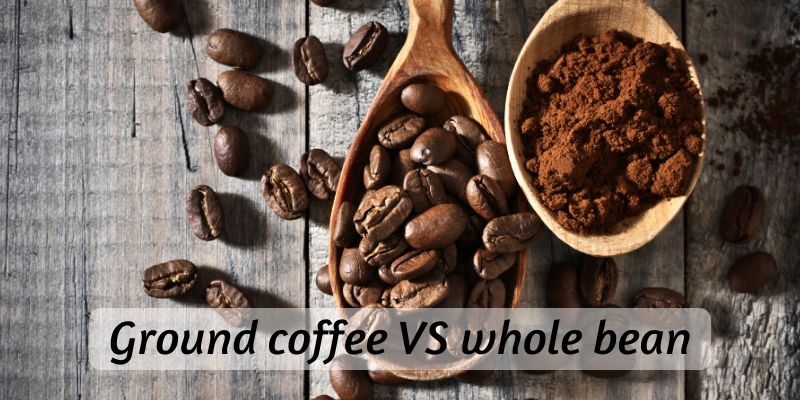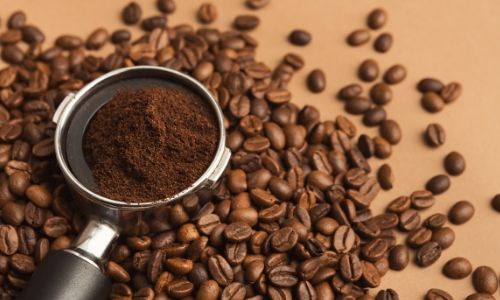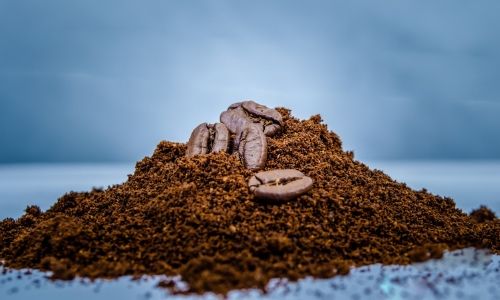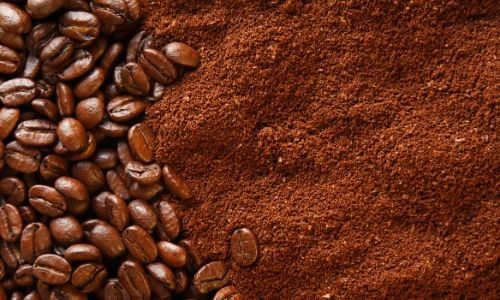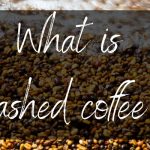Can't pick between ground coffee and whole beans ? There are some clear differences between the two in regard to how they make coffee and how easy they are to brew with.
In this post I'll give you the most relevant differences between ground coffee and whole beans, and also discuss which version is better, depending on your needs.
So let's start with the differences between ground coffee and whole beans, so you can easily pick your favorite. Or what works best for you.
Table of Contents
1. Whole beans stay fresh longer than ground coffee
If freshness is a key point for you, then whole bean coffee is what you need to get.
This is true for folks who:
- don't drink coffee often, and pre-ground coffee would lose aroma
- need the absolute freshest cup of coffee possible
- also have the time to grind a little at a time
Now, the problem with using pre-ground coffee is that it's going to lose freshness, very quickly. From the moment the beans were roasted and then ground, they start to lose their flavor in a matter of weeks.
Fortunately, most coffee companies do a great job at packaging their ground coffee very well, straight after grinding. So there won't be much lost when you buy the coffee.
However, from the moment you open your fresh pack of pre-ground coffee, it will start to wear off. If you use a container to keep your coffee in, and keep opening it every day (or several times a day) then your coffee may lose aroma very quickly.
So if you don't end up going through a pack of pre-ground coffee in about 3-4 weeks since opening it, then your coffee will be kind of stale by the end of those weeks.
No all coffees wear out the same, and not all coffee containers are made the same.
Make sure yours is a very good one, with airtight lining and lid, and heat resistant. If you need more info on how to properly store your coffee, here's my post on keeping coffee fresh.
All that being said, whole coffee beans are going to keep their aroma for much longer since you only grind a few beans at a time, when you need them.
Whole beans lose aroma as well, but much slower than pre-ground coffee and as such are better if you don't drink coffee very often.
2. Ground coffee is ready-to-use, more convenient
If convenience is more your thing, then pre-ground coffee is going to be much better for you.
It's easier to work with, as in it's already ground, and it's also very convenient since nearly all coffee companies offer pre-ground coffee.
So if you're ever in a rush and absolutely need your specific brand of coffee, you're going to easily find it if it's pre-ground.
There are several grind sizes though, and depending on what kind of brewing method you're using, you may need one size or another.
Most folks use espresso machines, drip-filters, or Aeropress. All of which use very fine to medium-fine grinds, which are all available in stores as pre-ground coffee.
For those who would like to use coarse ground coffee, or medium-coarse like for cold brew or French press the search is a little difficult, but even then you may find what you're looking for.
If you were to buy whole bean coffee, you'd have to grind it to the specific size you want. Depending on your disposition and the amount of time you have on your hands, that might be a good or bad thing.
3. Whole beans means you adjust the grind size
Speaking of, let's talk about grind size for a moment here. The upside to buying and using whole bean coffee (aside from freshness) is that you decide what grind size you use.
Meaning that you'll always get the exact kind of coffee you want, provided you've developed some skill in grinding coffee.
No worries, no one gets it right in their first couple of tries. But in time you'll manage to get the exact grind size you're looking for by just knowing when to stop the grinder.
Right, so what grind sizes would you need ? After all, we just discussed that pre-ground coffee already comes in the sizes most folks use.
Very true, but let's also keep in mind the previous point - pre-ground coffee becomes stale very quickly. And if you're the kind of person who does drink drip-filter coffee, but only twice a week, you'll lose a lot of coffee this way.
Another thing to keep in mind is that the very extremes of the grind spectrum - very finely ground coffee and coarse/extra coarse coffee are pretty hard to find. Or at least to find in the exact size you want.
Meaning you'll end up grinding you own coffee anyway. For this you'll need a burr grinder, since that brings the best consistency in grind size, without getting bits that are too small or too large.
This will also increase the overall cost of your coffee, since getting a grinder can set you back anywhere from $30 to $200, depending on what model you want.
4. Pre-ground coffee is usually more mainstream
What I mean by mainstream is that you'll find the most common coffee types, roast levels, and general grind sizes that most folks are asking for.
The mainstream coffee isn't a bad thing,it's just what is most sold/sought after.
Meaning that if you're usually drinking pure Arabica bean, medium roast, and medium-fine grind such as for drip-filter or pour over coffee then you're going to find it very easily.
All the most common coffee beans and types are available in supermarkets, as pre-ground coffee and even in whole bean form if you look hard enough.
If you're like to go off the beaten track and explore new coffee beans and roast levels, then looking for whole beans might be your best shot.
Why ? Because said coffee beans are most likely only found in smaller amounts (less demand) and in specialty coffee shops. Where,as the demand is lower, they're going to need to be kept for several months if need be.
Which means you'll find them in whole bean form, and can buy them as-is, in whatever pack size you want. Most shops like that will also roast the coffee for you, if you ask them.
So this is another thing to keep mind: how exotic or mainstream are your preferences in coffee ?
Chances are if you're looking for a more exotic, lesser known coffee bean from a specific farm then you're going to find it as a whole bean. In some cases it might even come unroasted, but those are rare.
5. Whole beans also means buying in bulk, so cheaper
Another item to think about: pre-ground coffee comes in small-ish packs. Somewhere around 250 gr/8.8 oz is the usual size, unless you're getting jumbo packs.
As such, over time it might end up costing more to buy pre-ground coffee, unless you find some special deals.
Whole bean coffee ends up being a little cheaper usually, since it's not gone through the grinder and as such the production cost ends up being lower.
Combine that with the fact that often you'll find the whole beans in whole kilogram bags, when you're definitely going to get some kind o deal or offer if you buy in bulk.
This is especially true if you buy from specialty shops, or stores that work with the coffee farmers directly.
Of course, there's also the cost of the grinder you're going to need to grind down the coffee. But that's a cost that can be stretched out for several payments, if you want.
And in the long run might still cost less than pre-ground coffee.
Now, this isn't a life-changing price difference - whole bean being cheaper than pre-ground - but when you take it into account and think of the other benefits, it begins to sound even better.
Also keep in mind that if you're running a coffee shop that uses espresso machines with built-in grinders, you're only going to be paying for the coffee. And will always have freshly ground coffee on demand.
Is it better to buy pre-ground coffee or whole beans ?
Alright, now taking everything into account which one ends up being the best coffee ?
Should you buy pre-ground or whole bean coffee ?
The truth is that it's a really subjective topic. It really does depend on what you want to do with that coffee.
If you're a regular Joe and drink coffee every morning before going to work, and maybe a another small one after coming home then pre-ground isn't bad.
You're getting already ground coffee that you can just pop into the coffee machine and press a button (or the equivalent).
But if you're really looking for extra freshness and exotic flavors, then a whole bean might be the only way you're going to get them. grinding coffee at home is only going to take a few minutes and if you have the extra time, why not do it ?
Personally I'm a pre-ground coffee gal. I have two coffees every day, and generally go through a 250 gr/8.8 oz pack in a month (2 person household). I use a drip-filter and the beans are mostly Arabica.
Pretty standard stuff, you could say. And you'd be right. If you're in the same boat as me, you're probably doing the same thing.
Conclusion
Pre-ground coffee and whole bean coffee are both great forms of coffee, but it really matters what you're going to do with them. How often you drink coffee, how well you can store your coffee, what your budget is, and just generally knowing your flavor preferences.
Once you've got those down, you'll know exactly what kind of coffee to get.
If you want to know more about coffee or tea, feel free to check the related articles below. Who knows what else you might find ?

